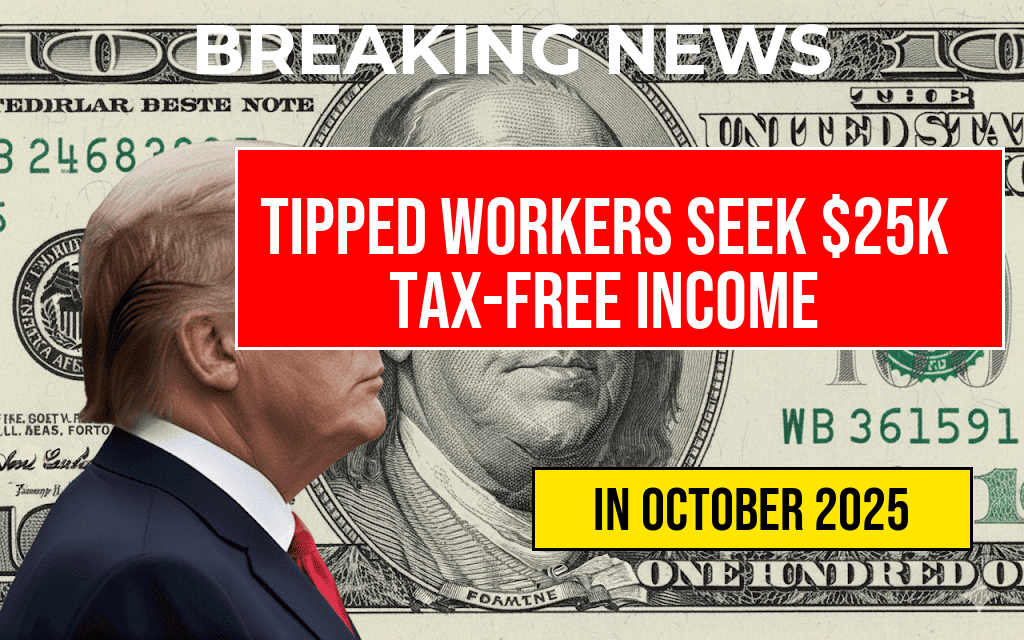As the tax season approaches, tipped workers across the United States are setting their sights on achieving a $25,000 tax-free income threshold. This goal is part of a broader effort to maximize earnings while navigating the complexities of the tax code. However, many may not be aware that reaching this income level could inadvertently jeopardize their eligibility for the Earned Income Tax Credit (EITC), a vital financial benefit for low-to-moderate-income earners. Analysts estimate that some workers could lose over $1,000 in EITC benefits if they do not carefully manage their reported income. The implications of this situation are significant, as they affect the financial well-being of millions of workers reliant on tipping as their primary source of income.
The Importance of Tipped Income
Tipped workers, including those in the restaurant, hospitality, and personal services industries, often depend on tips to supplement their base wages. The federal minimum wage for tipped employees is significantly lower than the standard minimum wage, which creates a reliance on tips for overall income. Many workers aim to keep their reported earnings just under the $25,000 threshold to take full advantage of the EITC, a crucial tax benefit designed to alleviate poverty and encourage employment.
Understanding the Earned Income Tax Credit
The EITC is a refundable tax credit aimed at supporting low-to-moderate-income workers. According to the IRS, the credit amount varies based on income, filing status, and number of qualifying children. For the 2022 tax year, eligible workers can receive a credit of up to $6,728, depending on their circumstances.
Potential Risks for Tipped Workers
While the pursuit of a $25,000 tax-free income is appealing, many tipped workers may not realize that exceeding the income limit can lead to a significant loss of EITC benefits. For example, a worker earning $26,000 could potentially forfeit more than $1,000 in tax credits, which could have provided crucial financial assistance throughout the year.
- Income Threshold: The EITC begins to phase out after reaching certain income levels, particularly for single filers and those with children.
- Tax Implications: Reporting higher earnings can push workers into a higher tax bracket, leading to increased tax liabilities.
- Eligibility Confusion: Many workers are unaware of the nuances associated with the EITC, resulting in potential misreporting of income.
Strategies for Maximizing Income and Benefits
To navigate the complexities of income reporting and tax benefits, workers can adopt several strategies:
- Maintain Accurate Records: Keeping detailed records of tips received can help workers accurately report income without exceeding thresholds.
- Consult Tax Professionals: Seeking advice from tax professionals can provide clarity on how to maximize both earnings and benefits.
- Stay Informed: Understanding changes in tax laws and credits can help workers adapt their strategies to ensure they do not miss out on valuable benefits.
Community Support and Resources
Organizations and advocacy groups are increasingly stepping in to support tipped workers. Many provide educational resources to help workers understand their rights and the intricacies of tax credits. For instance, the National Employment Law Project offers comprehensive information on the EITC and how it affects low-wage workers.
Conclusion
The pursuit of a $25,000 tax-free income by tipped workers highlights the balancing act many face between maximizing earnings and retaining vital tax credits. While the goal of financial independence is commendable, the risk of losing over $1,000 in EITC benefits poses a significant challenge. By staying informed and seeking assistance, workers can navigate these complexities to secure a more stable financial future.
Frequently Asked Questions
What is the goal of tipped workers regarding their tax-free income?
Tipped workers aim to achieve $25,000 in tax-free income to maximize their earnings while minimizing their tax obligations.
How can tipped workers risk losing EITC benefits?
By targeting a $25,000 income, some tipped workers may inadvertently exceed eligibility thresholds for the Earned Income Tax Credit (EITC), potentially risking over $1,000 in benefits.
What is the Earned Income Tax Credit (EITC)?
The Earned Income Tax Credit (EITC) is a tax credit designed to benefit low to moderate-income working individuals, providing a financial boost based on income and family size.
Why is tax-free income appealing to tipped workers?
Tax-free income is appealing as it allows tipped workers to retain a larger portion of their earnings, enabling them to increase their overall financial stability.
What should tipped workers consider when reporting their income?
Tipped workers should carefully consider the implications of reporting their income to ensure they do not exceed the limits that could affect their eligibility for the EITC while still maximizing their tax-free earnings.






